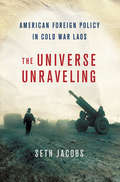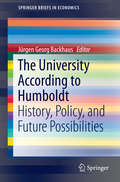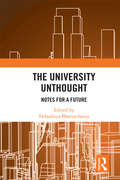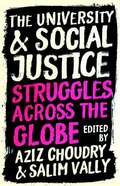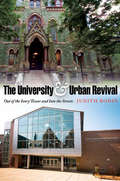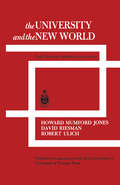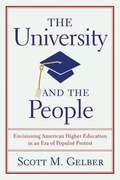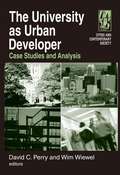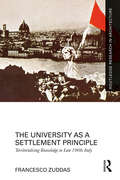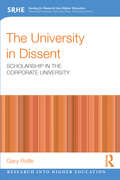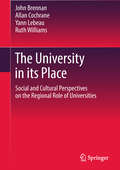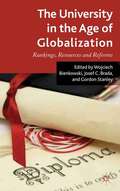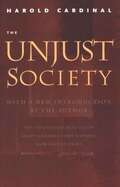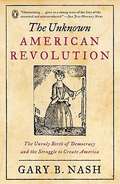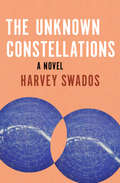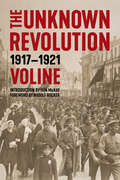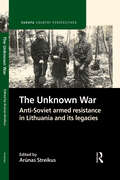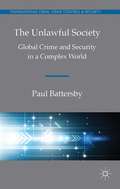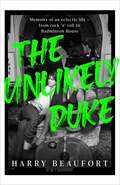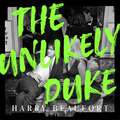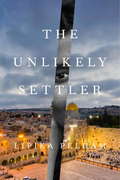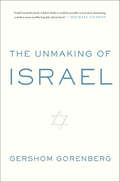- Table View
- List View
The Universe Unraveling: American Foreign Policy in Cold War Laos (The United States in the World)
by Seth JacobsDuring the Eisenhower and Kennedy administrations, Laos was positioned to become a major front in the Cold War. Yet American policymakers ultimately chose to resist communism in neighboring South Vietnam instead. Two generations of historians have explained this decision by citing logistical considerations. Laos's landlocked, mountainous terrain, they hold, made the kingdom an unpropitious place to fight, while South Vietnam-possessing a long coastline, navigable rivers, and all-weather roads-better accommodated America's military forces. The Universe Unraveling is a provocative reinterpretation of U. S. -Laos relations in the years leading up to the Vietnam War. Seth Jacobs argues that Laos boasted several advantages over South Vietnam as a battlefield, notably its thousand-mile border with Thailand, whose leader was willing to allow Washington to use his nation as a base from which to attack the communist Pathet Lao. More significant in determining U. S. policy in Southeast Asia than strategic appraisals of the Laotian landscape were cultural perceptions of the Lao people. Jacobs contends that U. S. policy toward Laos under Eisenhower and Kennedy cannot be understood apart from the traits Americans ascribed to their Lao allies. Drawing on diplomatic correspondence and the work of iconic figures like "celebrity saint" Tom Dooley, Jacobs finds that the characteristics American statesmen and the American media attributed to the Lao-laziness, immaturity, and cowardice-differed from the traits assigned the South Vietnamese, making Lao chances of withstanding communist aggression appear dubious. The Universe Unraveling combines diplomatic, cultural, and military history to provide a new perspective on how prejudice can shape policy decisions and even the course of history.
The University According to Humboldt
by Jürgen Georg BackhausThis book discusses the philosophy and educational reforms initiated by Wilhelm von Humboldt as well as their legacy in the modern university system. It begins with a discussion of the history of the university from antiquity and the Middle Ages through the era of Humboldt's reforms and its remnants in and implications for the present day. The authors then delve into policy, outlining the key conflicts that have informed the development of university educational policy, such as the clash between academia and professional education, the coordination of public administration and educational institutions, and the perennial issue of funding. Humboldt's ideas are then discussed within an economic context, using his principals of the state to analyze the relationship between current models of household and family economics and German economic and social policy. The book is rounded off by a philosophical analysis of the institution of the university and concludes with an update of the remains Humboldt's reforms within the current university system. With its multidisciplinary approach to the study of higher education reform in Europe and its key players, this book will appeal to scholars of economic history, educational policy, and public administration as well as administrators and policy makers in higher education.
The University Unthought: Notes for a Future
by Debaditya BhattacharyaWhy is it important to have a revolutionary critical pedagogy? What are the new inter/disciplinary engagements possible within the university? What will it be like to live and learn in this university of the future? Drawing on these essential questions, this volume explores the political future(s) of the university. It does not take a simplistic recourse to the tenets of liberal democracy but seeks a more engaged positioning of the university space within everyday practices of the social. It cross-examines the history of this ‘ideal’ university’s relationship with the banal everyday, the ‘apolitical’ outside and what exceeds intellectual reason, to finally question if such historicizing of the university is necessary at all. Along with its companion The Idea of the University: Histories and Contexts, this brave new intervention makes a compelling foray into the political future(s) of the university. It will be of interest to academics, educators and students of the social sciences and humanities, especially education. It will also be of use to policy-makers and education analysts, and be central to the concerns of any citizen.
The University and Social Justice: Struggles across the Globe
by Aziz Choudry and Salim VallyHigher education has long been contested terrain. From student movements to staff unions, the fight for accessible, critical, and quality public education has turned university campuses globally into sites of struggle. Whether calling for the decommodification or the decolonization of education, many of these struggles have attempted to draw on (and, in turn, resonate with) longer histories of popular resistance, broader social movements, and radical visions of a fairer world. In this critical collection, Aziz Choudry, Salim Vally, and a host of international contributors bring grounded, analytical accounts of diverse struggles relating to higher education into conversation with each other. Featuring contributions written by students and staff members on the frontline of struggles from 12 different countries, including Canada, Chile, France, India, Mexico, Nigeria, Occupied Palestine, the Philippines, South Africa, Turkey, the UK, and the US, the book asks what can be learned from these movements’ strategies, demands, and visions.
The University and Urban Revival
by Judith RodinIn the last quarter of the twentieth century, urban colleges and universities found themselves enveloped by the poverty, crime, and physical decline that afflicted American cities. Some institutions turned inward, trying to insulate themselves rather than address the problems in their own backyards. Others attempted to develop better community relations, though changes were hard to sustain.Spurred by an unprecedented crime wave in 1996, University of Pennsylvania President Judith Rodin knew that the time for urgent action had arrived, and she set a new course of proactive community engagement for her university. Her dedication to the revitalization of West Philadelphia was guided by her role not only as president but also as a woman and a mother with a deep affection for her hometown.The goal was to build capacity back into a severely distressed inner-city neighborhood--educational capacity, retail capacity, quality-of-life capacity, and especially economic capacity--guided by the belief that "town and gown" could unite as one richly diverse community.Cities rely on their academic institutions as stable places of employment, cultural centers, civic partners, and concentrated populations of consumers for local business and services. And a competitive university demands a vibrant neighborhood to meet the needs of its faculty, staff, and students. In keeping with their mission, urban universities are uniquely positioned to lead their communities in revitalization efforts, yet this effort requires resolute persistence.During Rodin's administration (1994-2004), the Chronicle of Higher Education referred to Penn's progress as a "national model of constructive town-gown interaction and partnership." This book narrates the challenges, frustrations, and successes of Penn's campaign, and its prospects for long-term change.
The University and the New World: York University Invitation Lecture Series
by Howard Jones David Riesman Robert UlichThis is the first volume in the Invitation Lecture Series of York University and it is an auspicious beginning. Three leaders in higher education in the United States here present their thoughts on challenging questions of enrolment, curriculum, and standards which today confront the ever expanding universities of North America. Professor Jones describes "The Idea of a University Once More"; Professor Riesman outlines and comments on some significant recent "Experiments in Higher Education"; Professor Ulich discusses a theme which is vitally important for the effect of university education, "Creativity."
The University and the People
by Scott M. GelberThe University and the Peoplechronicles the influence of Populism—a powerful agrarian movement—on public higher education in the late nineteenth century. Revisiting this pivotal era in the history of the American state university, Scott Gelber demonstrates that Populists expressed a surprising degree of enthusiasm for institutions of higher learning. More fundamentally, he argues that the mission of the state university, as we understand it today, evolved from a fractious but productive relationship between public demands and academic authority. Populists attacked a variety of elites—professionals, executives, scholars—and seemed to confirm academia’s fear of anti-intellectual public oversight. The movement’s vision of the state university highlighted deep tensions in American attitudes toward meritocracy and expertise. Yet Populists also promoted state-supported higher education, with the aims of educating the sons (and sometimes daughters) of ordinary citizens, blurring status distinctions, and promoting civic engagement. Accessibility, utilitarianism, and public service were the bywords of Populist journalists, legislators, trustees, and sympathetic professors. These “academic populists” encouraged state universities to reckon with egalitarian perspectives on admissions, financial aid, curricula, and research. And despite their critiques of college “ivory towers,” Populists supported the humanities and social sciences, tolerated a degree of ideological dissent, and lobbied for record-breaking appropriations for state institutions.
The University as Urban Developer: Case Studies and Analysis (Cities And Contemporary Society Ser.)
by Wim Wiewel David C. PerryIntegrating topics in urban development, real estate, higher education administration, urban design, and campus landscape architecture, this is the first book to explore the role of the university as developer. Accessible and clearly written, and including contributions from authorities in a wide range of related areas, it offers a rich array of case studies and analyses that clarify the important roles that universities play in the growth and development of cities. The cases describe a host of university practices, community responses, and policy initiatives surrounding university real estate development. Through a careful blending of academic analysis and practical, hands-on administrative and political information, the book charts new ground in the study of the university and the city.
The University as a Settlement Principle: Territorialising Knowledge in Late 1960s Italy (Routledge Research in Architecture)
by Francesco ZuddasThe 1960s and the 1970s marked a generational shift in architectural discourse at a time when the revolts inside universities condemned the academic institution as a major force behind the perpetuation of a controlling society. Focusing on the crisis and reform of higher education in Italy, The University as a Settlement Principle investigates how university design became a lens for architects to interpret a complex historical moment that was marked by the construction of an unprecedented number of new campuses worldwide. Implicitly drawing parallels with the contemporary condition of the university under a regime of knowledge commodification, it reviews the vision proposed by architects such as Vittorio Gregotti, Giuseppe Samonà, Archizoom, Giancarlo De Carlo, and Guido Canella, among others, to challenge the university as a bureaucratic and self-contained entity, and defend, instead, the role of higher education as an agent for restructuring vast territories. Through their projects, the book discusses a most fertile and heroic moment of Italian architectural discourse and argues for a reconsideration of architecture’s obligation to question the status quo. This work will be of interest to postgraduate researchers and academics in architectural theory and history, campus design, planning theory, and history.
The University in Dissent: Scholarship in the corporate university (Research into Higher Education)
by Gary RolfeThe rise of corporatism in the North American University was charted by Bill Readings in the mid nineteen-nineties in his book The University in Ruins. The intervening years have seen the corporate university grow and extend to the point where its evolution into a large business corporation is seemingly complete. Rolfe’s book examines the factors contributing to the transformation of the university from a site of culture and knowledge to what might be termed an ‘information factory’, and explores strategies for how, in Readings’ words, members of the academic community might continue to ‘dwell in the ruins of the university’ in a productive and authentic way. Drawing on the work of critics and philosophers such as Barthes, Derrida, Lyotard and Deleuze, The University in Dissent suggests that this can only be achieved subversively through the development of a ‘community of philosophers’ who are prepared to challenge, critique and subvert the mission statement of the ‘university of excellence’ from within, focusing on how scholarly and academic thought and writing might develop in this new post-Enlightenment era. Summarising, contextualising and extending previous understandings of the rise of corporatism and the subsequent demise of the traditional aims and values of the university, Rolfe assesses the situation in contemporary UK and international settings. He recognises that changes to the traditional idea of the university are inevitable and explores some of the challenges and consequences of this shift in the academic world, suggesting how academics can work with change, whilst at the same time seeking to undermine its worst excesses. This timely and thought provoking book is a must-read for all academics at University level, as well as education policy makers.
The University in its Place: Social And Cultural Perspectives On The Regional Role Of Universities (Higher Education Dynamics Ser.)
by Ruth Williams John Brennan Allan Cochrane Yann LebeauThis book sets out to understand the significance of geographical context – place – for universities in the globalised setting of the twenty-first century. It examines their social impact on the regions in which they are situated, both from the perspectives of the universities themselves and from the perspectives of a range of different local and regional interest groups. It draws on a national study in the UK which has examined the role played by universities in four contrasting regional contexts. This UK study will be set within the larger theoretical and international literature on the role played by universities in processes of social change and transformation. An important theme of the book is the effects of university activities on various socially disadvantaged groups and consideration is given to whether there are ‘winners’ and ‘losers’ arising from the activities and interventions of universities. The book distinguishes between ‘discourses’, ‘activities’ and their ‘impacts’ in considering the role of universities and emphasises the importance of history and context as important mediators of national and institutional policies. It examines some of the key partnerships which universities enter into within their regions and considers some of the factors which determine the nature of these partnerships. Implications are drawn out for university leaderships and for regional and national policy bodies. The book provides empirical evidence in a field marked by a considerable amount of rhetoric from interested parties. One of the book’s conclusions is that there is considerable diversity among higher education institutions in how they perform a regional role, but it is a significant question for each of them. Institutional variation and regional setting come together to shape what is achievable.
The University in the Age of Globalization: Rankings, Resources and Reforms
by Wojciech Bienkowski Josef C. Brada Gordon StanleyAn informed discussion of the global education market, analysing the rankings system, and the determinants which help universities to advance. The authors examine possible improvements in the promotion and commercialization of university research, and the role of universities in the social and economic development of transition economies.
The Unknown American Revolution: The Unruly Birth of Democracy and the Struggle to Create America
by Gary B. NashIn this audacious recasting of the American Revolution, distinguished historian Gary Nash offers a profound new way of thinking about the struggle to create this country, introducing readers to a coalition of patriots from all classes and races of American society. From millennialist preachers to enslaved Africans, disgruntled women to aggrieved Indians, the people so vividly portrayed in this book did not all agree or succeed, but during the exhilarating and messy years of this country's birth, they laid down ideas that have become part of our inheritance and ideals toward which we still strive today.
The Unknown Constellations: A Novel
by Harvey SwadosWhen Jack Rodenko shipped out as a sailor during World War II, he never imagined that real adventure would be waiting for him at home in New OrleansThe Crescent City after the war is at the heart of a rapidly changing America, and ex-sailor Jack Rodenko is caught up in a strange and shifting milieu as he tends bar at a seedy club called L&’Êtoile. While struggling to build a new life, Rodenko becomes involved with a corrupt, greedy power broker, and falls in love with a striking photographer—relationships that will force him to choose between two decidedly different futures. First published decades after the author&’s death in 1972, The Unknown Constellations is the first novel by unsung postwar literary hero Harvey Swados. Through these pages, we can trace the origins of a unique voice and an unerring conscience.
The Unknown Constellations: A Novel
by Harvey SwadosWhen Jack Rodenko shipped out as a sailor during World War II, he never imagined that real adventure would be waiting for him at home in New OrleansThe Crescent City after the war is at the heart of a rapidly changing America, and ex-sailor Jack Rodenko is caught up in a strange and shifting milieu as he tends bar at a seedy club called L&’Êtoile. While struggling to build a new life, Rodenko becomes involved with a corrupt, greedy power broker, and falls in love with a striking photographer—relationships that will force him to choose between two decidedly different futures. First published decades after the author&’s death in 1972, The Unknown Constellations is the first novel by unsung postwar literary hero Harvey Swados. Through these pages, we can trace the origins of a unique voice and an unerring conscience.
The Unknown Revolution: 1917–1921
by Voline Iain McKayThis is the untold story of the Russian Revolution: its antecedents, its far-reaching changes, its betrayal by Bolshevik terror, and the massive resistance of non-Bolshevik revolutionaries. This in-depth, eyewitness history written by Voline, an outspoken activist in the Russian Revolution, contains a biography of the author by Rudolf Rocker and a contemporary introduction from anarchist historian Iain McKay Significant attention is given to what the author describes as "struggles for the real Social Revolution"; that is, the uprising of the sailors and workers of Kronstadt in 1921, and the peasant movement that Nestor Makhno led in the Ukraine. These movements, which sought to defend the social revolution from destruction by the politicians, provide important material for a clearer understanding of both the original objectives of the Russian Revolution and the problems with which all revolutions with far-reaching social objectives have to contend. Of particular interest to the student of the Russian revolution are the chapters of personal experiences and those in which the author, drawing on the revolutionary press of the time, reveals the deep cleavage between the objectives of the Libertarians and those of the Bolsheviks, differences which the latter "resolved" by ruthlessly eliminating all those who stood in their way in the struggle for power. This edition is a translation of the full text of La Révolution inconnue, first published in 1947. It reinstates material omitted from earlier English-language editions and reproduces the complete text of the original volumes. Voline, writer, educator, and poet, was exiled by the Tsarist tribunal and ordered by Trotsky to be executed but was rescued by protests. He never ceased to live up to his chosen nom de guerre, based on the Russian word for freedom.
The Unknown War: Anti-Soviet armed resistance in Lithuania and its legacies (Europa Country Perspectives)
by Arūnas StreikusThe armed anti-Soviet resistance movement which arose in the second half of 1944 in Lithuania, as Soviet forces began to reoccupy the Baltic countries and Galicia, sparking a nearly decade-long fierce military conflict, has yet to become established in the common narrative of contemporary European history. However, controversy regarding the nature of this `war after the war' and its legacies constitutes one of the core elements in the contemporary information warfare waged by Russia against its neighbouring countries. The origins of various distortions surrounding the story of the partisan war in the western borderlands of the Soviet Union can even be traced to the final stages of that war, when Soviet propaganda sought to discredit the campaign as a battle waged by criminal elements. In this example of a historical event charged with controversial memories and geopolitical connotations, a thorough academic approach is extraordinarily instrumental. Responding to the growing need for historical research capable of providing international readers with the latest findings in the thematic field under question, six scholars from Vilnius University address the diverse aspects of this phenomenon as well as its role in the culture and politics of memory. Toward this end, this analysis – among the most comprehensive explorations of this history to date – is being released in both Lithuanian and English.
The Unlawful Society
by Paul BattersbyExploring the dynamics of law-making in a world where the pace of technological change is outstripping our capacity to capture new forms of transnational crime, this book uses the innovative concept of unlawfulness to examine the crimes of the global overworld, forming a unique analysis of global order in the twenty-first century.
The Unlikely Candidate: What Losing an Election Taught Me about How to Change Politics
by Ali MilaniAcross the Western world, people are desperate for a radical shift in politics and for new kinds of politicians. Primary defeats for established figures and shock results in referendums are becoming the norm, while outsiders are shaking up political cultures. In this book, Ali Milani, a rising star in the UK’s Labour Party, brings a unique perspective to the key political issues we're facing in the wake of the COVID-19 pandemic, and shows how young people from all walks of life can engage in politics to transform our country and the world. Drawing on his rollercoaster campaign against Prime Minister Boris Johnson in the UK’s 2019 general election and his time in Bernie Sanders’ campaign team, he aims to inspire a new generation, including the disenfranchised, disillusioned and marginalised, to raise their voices and change mainstream politics for the better.
The Unlikely Duke: Memoirs of an eclectic life - from rock 'n' roll to Badminton House
by Harry Beaufort'Beaufort chronicles his unusual and rarified world with flashes of Wodehousian genius'. --- Jools Holland'So funny ... bristling with glamorous but eccentric characters'. --- Jilly Cooper'Very funny and touching, gentle, wise and unpretentious. This is a book I absolutely loved.' --- Anne GlenconnerThe 12th Duke of Beaufort, known to his friends as 'Bunter', inherited his Dukedom and Badminton House in 2017, at the age of sixty-five. But he is also a singer and songwriter with the rock group The Listening Device. Now he combines his responsibilities as Duke with his life as a rock performer. In this lively and anecdote-filled memoir, Harry Beaufort takes us behind the scenes of his varied life: from playing poker with politicians, to partying on Ibiza with film stars to people watching with The Queen from a balcony at Windsor Castle. He offers an intimate portrait of aristocratic privilege and a lifetime filled with rock stars, royalty, eccentrics and jaw-droppingly unbelievable stories. But Harry also offers a sensitive and perceptive insight into the worlds he has inhabited and the friendships and laughter that he has experienced along the way. This is the story of an ordinary man facing up to his extraordinary inheritance-the story of The Unlikely Duke.
The Unlikely Duke: Memoirs of an eclectic life - from rock 'n' roll to Badminton House
by Harry Beaufort'Beaufort chronicles his unusual and rarified world with flashes of Wodehousian genius'. --- Jools Holland'So funny ... bristling with glamorous but eccentric characters'. --- Jilly Cooper'Very funny and touching, gentle, wise and unpretentious. This is a book I absolutely loved.' --- Anne GlenconnerThe 12th Duke of Beaufort, known to his friends as 'Bunter', inherited his Dukedom and Badminton House in 2017, at the age of sixty-five. But he is also a singer and songwriter with the rock group The Listening Device. Now he combines his responsibilities as Duke with his life as a rock performer. In this lively and anecdote-filled memoir, Harry Beaufort takes us behind the scenes of his varied life: from playing poker with politicians, to partying on Ibiza with film stars to people watching with The Queen from a balcony at Windsor Castle. He offers an intimate portrait of aristocratic privilege and a lifetime filled with rock stars, royalty, eccentrics and jaw-droppingly unbelievable stories. But Harry also offers a sensitive and perceptive insight into the worlds he has inhabited and the friendships and laughter that he has experienced along the way. This is the story of an ordinary man facing up to his extraordinary inheritance-the story of The Unlikely Duke.
The Unlikely Duke: Memoirs of an eclectic life - from rock 'n' roll to Badminton House
by Harry Beaufort'Beaufort chronicles his unusual and rarified world with flashes of Wodehousian genius'. --- Jools Holland'So funny ... bristling with glamorous but eccentric characters'. --- Jilly Cooper'Very funny and touching, gentle, wise and unpretentious. This is a book I absolutely loved.' --- Anne GlenconnerThe 12th Duke of Beaufort, known to his friends as 'Bunter', inherited his Dukedom and Badminton House in 2017, at the age of sixty-five. But he is also a singer and songwriter with the rock group The Listening Device. Now he combines his responsibilities as Duke with his life as a rock performer. In this lively and anecdote-filled memoir, Harry Beaufort takes us behind the scenes of his varied life: from playing poker with politicians, to partying on Ibiza with film stars to people watching with The Queen from a balcony at Windsor Castle. He offers an intimate portrait of aristocratic privilege and a lifetime filled with rock stars, royalty, eccentrics and jaw-droppingly unbelievable stories. But Harry also offers a sensitive and perceptive insight into the worlds he has inhabited and the friendships and laughter that he has experienced along the way. This is the story of an ordinary man facing up to his extraordinary inheritance-the story of The Unlikely Duke.
The Unlikely Settler
by Lipika PelhamThe Israeli-Palestinian conflict seen by an outsider who craves to make sense of herself, her marriage, and the city she lives inThe Unlikely Settler is none other than a young Bengali journalist who moves to Jerusalem with her English-Jewish husband and two children. He speaks Arabic and is an arch believer in the peace process; she leaves her career behind to follow his dream. Jerusalem propels Pelham into a world where freedom from tribal allegiance is a challenging prospect. From the school you choose for your children to the wine you buy, you take sides at every turn.Pelham's complicated relationship with her husband, Leo, is as emotive as the city she lives in, as full of energy, pain, and contradictions. As she tries to navigate the complexities and absurdities of daily life in Jerusalem, often with hilarious results, Pelham achieves deep insights into the respective woes and guilt of her Palestinian and Israeli friends. Her intelligent analysis suggests a very different approach to a potential resolution of the conflict.
The Unmaking of Israel
by Gershom Gorenberg“Closely argued and conditionally apocalyptic . . . Gorenberg outlines many reasonable steps Israel should take to disentangle religion from the state.” —Jeffrey Goldberg, The New York Times Book ReviewProminent Israeli journalist Gershom Gorenberg offers a penetrating and provocative look at how the balance of power in Israel has shifted toward extremism, threatening the prospects for peace and democracy as the Israeli-Palestinian conflict intensifies. Informing his examination using interviews in Israel and the West Bank and with access to previously classified Israeli documents, Gorenberg delivers an incisive discussion of the causes and trends of extremism in Israel’s government and society. Michael Chabon, Pulitzer Prize-winning author of The Amazing Adventures of Kavalier and Clay, writes, “until I read The Unmaking of Israel, I didn’t think it could be possible to feel more despairing, and then more terribly hopeful, about Israel, a place that I began at last, under the spell of Gershom Gorenberg’s lucid and dispassionate yet intensely personal writing, to understand.”“At the core of the book lies a terrifying analogy: Israel as Pakistan, a country whose government has empowered a lawless, fanatical religious movement now subverting the very state that empowered it. Is the analogy apt today? No, but Gorenberg makes a frighteningly convincing case that it might be soon.” —Peter Beinart, Newsweek“Gorenberg provides a deft but penetrating and highly nuanced account of the recent history and current politics of Israel . . . He issues a heartfelt and heart-rending plea for the repair of the Jewish democracy.” —The Jewish Journal“Sure to raise contention, a strong dissenting voice from a burdened land where dissent is not simply tolerated, but a way of life.” —Kirkus Reviews
